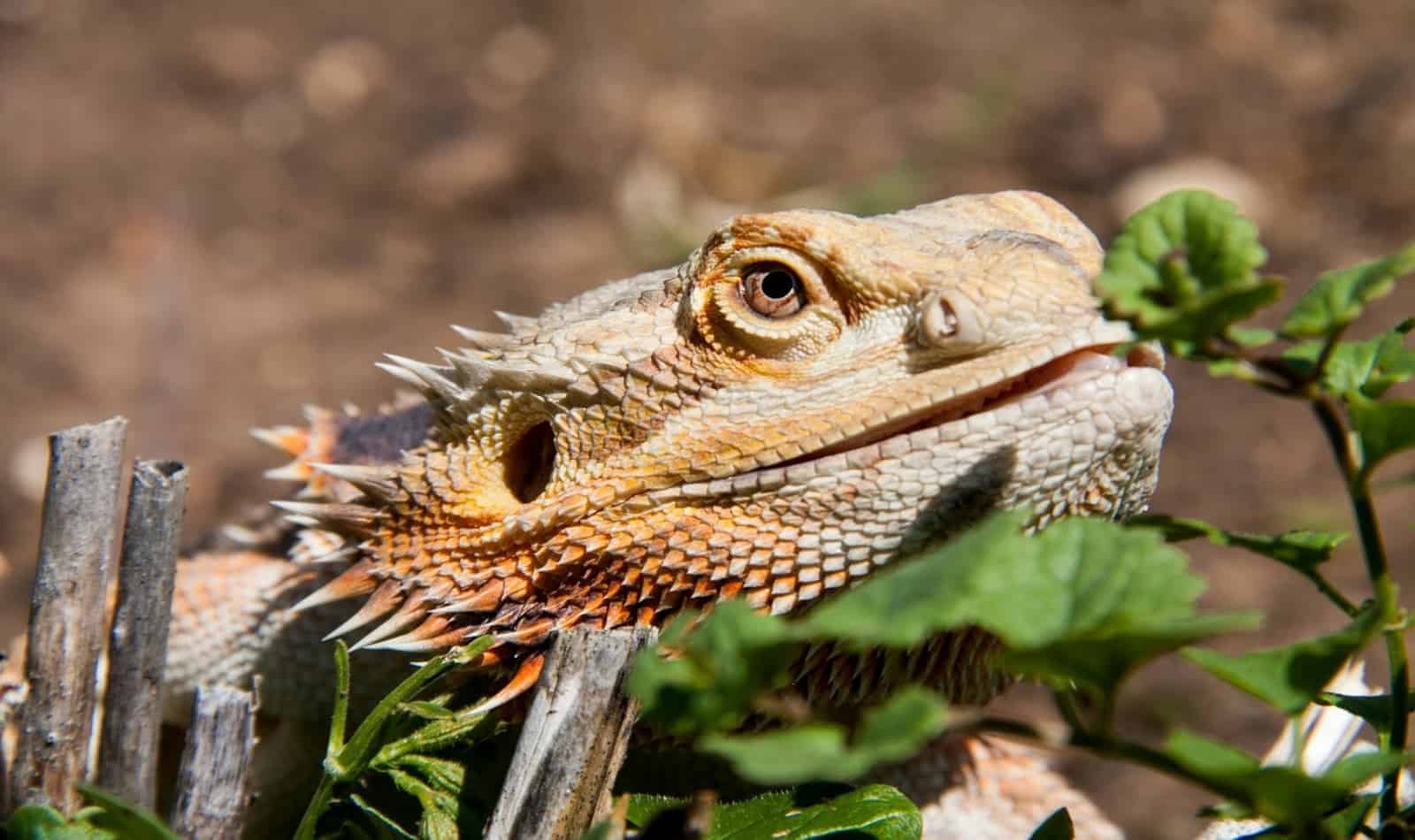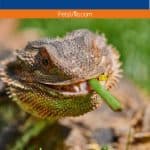Can bearded dragons eat pea shoots?
If you’re wondering the same thing, keep reading!
Below, we will look at the answer, as well as other parts of the pea plant that are safe for beardies and more.
We have a lot to cover, so let’s dive in!
Check and purchase this amazing e-book to know What to Feed Your Bearded Dragon!
Table of Contents
Can bearded dragons eat pea shoots?
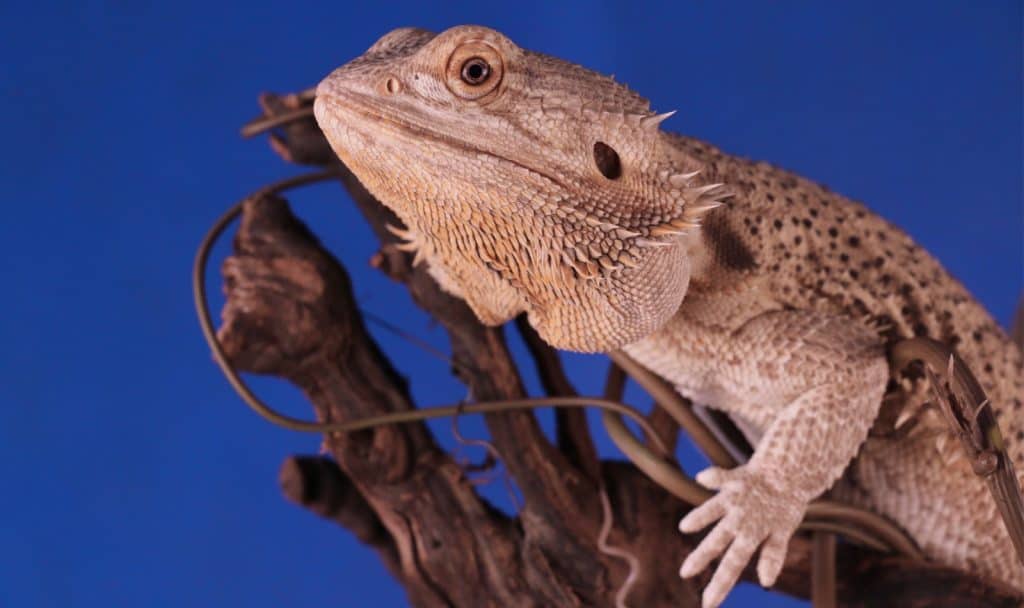
According to the NC State veterinary hospital, yes, bearded dragons can eat pea shoots and pea plants in general.
In fact, not only can they eat them, but they’re actually good for your pet, too. They are a source of calcium and phosphorus, which your bearded pet needs.
However, the vegetables need to be interchanged so that you are not feeding your dragon with pea shoots for a whole week.
With the long list of greens that your pet can eat, try to alternate them so that your pal does not get bored by one feed or develop digestive issues.
Other veggies with a great calcium-to-phosphorus ratio include:
- mustard greens
- collard greens
- dandelion greens/flowers
- endive
- turnips
- sweet potato
- green beans
- grape leaves
- leaf lettuces
- carrots
- bell peppers
- alfalfa plant
- acorn and butternut squash.
While these greens should make up the bulk of your bearded dragon’s daily salad, you can give the following as treats to make a complete balanced diet:
- apples
- blueberries
- oranges
- rose
- papayas
- raspberries
- petunias
- radish greens
- pansies
- strawberries
- peaches
- geranium flowers
- bananas
- apricots
- berry
- cantaloupe
- grapes
- blackberries
- tomatoes
- pears.
These fruits are all rich in Vitamin A and calcium.
While I did come across some anecdotal claims that the calcium-to-phosphorus ratio in pea shoots is not healthy, there is no scientific backing for this argument.
How Often Can Bearded Dragons Eat pea shoots?
That all depends on their age. Baby dragons need the least amount of pea shoots. They do not need that many vegetables as they grow up.
On the other hand, adult dragons could do with more of the pea shoots mixed in with other leafy greens.
Can You Grow Your Own Pea Shoots?
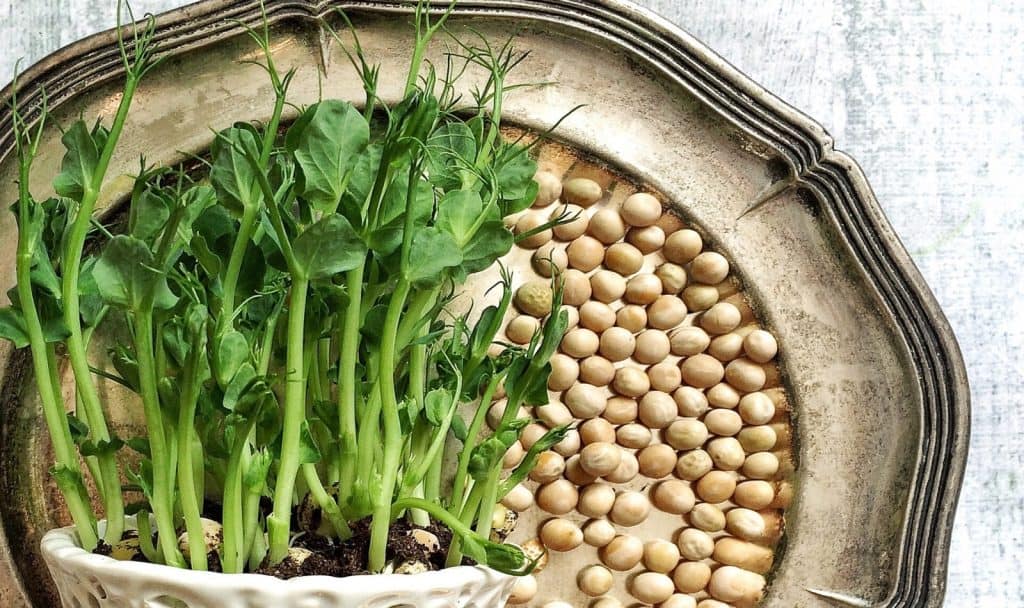
If you can grow peas, then yes, you can grow your own pea shoots (since they’re part of the same plant).
Pea shoots are the tender green vine tips of garden peas. They are usually 2 to 6 inches and will have about 2 to 4 pairs of leaves after a few weeks.
These green beans will do well in sandy, loam, or clay soils. During winter, you could plant the peas in containers.
You can then move the boxes from the house to the outdoors when there is sufficient sunlight for them to enjoy.
Peas will require a soil pH of 6.0 to 7.0. Peas need adequate hydration during their growth.
When harvesting your pea shoots, which should be in a month after sowing seeds, you are advised not to cut the entire stem.
Just snip the tender leaves at the top since the branch will grow more leaves. This way, you can get one pea shoot harvest after the other.
Make sure you use sharp scissors so you do not injure the plant.
If you are growing the pea shoots as bearded dragon food, do not use pesticides, fertilizers, or chemical weed/herb removers.
You can kill parasites organically. This is because your pet will ingest the chemicals, and this could cause digestive issues or other health issues.
Now that we’ve covered pea shoots, let’s talk about other parts of the plant as well as some different types of peas (including frozen and canned).
Can Bearded Dragons Eat Pea Pods?
Yes, your dragon friend will hungrily crunch your pea pods. They form part of its leafy greens and will provide it will vitamin A and calcium.
Can My Bearded Dragon Eat Peas?
Yes, your scaly pal can eat those too. So, if you’re growing them yourself for your pet, nothing goes to waste.
Can Bearded Dragons Eat Sugar Snap Peas?
Yes, bearded dragons can eat sugar snap peas.
In fact, sugar snap peas are rich in vitamin A, K, and C. They also have calcium. They are, therefore, perfect for your bearded friend.
Can Bearded Dragons Eat Frozen Peas?
Though they prefer to eat fresh foods, your bearded reptile will still eat frozen peas.
Research has shown that though canned and frozen foods might lack a few vitamins, they still have all the other nutrients intact.
The problem with frozen peas is that they do not have a similar flavor to fresh ones.
But if frozen or canned peas is all you have got and is what you have given to your dragon friend, he can safely eat them.
Vegetables That You Should Not Give Your Bearded Dragon
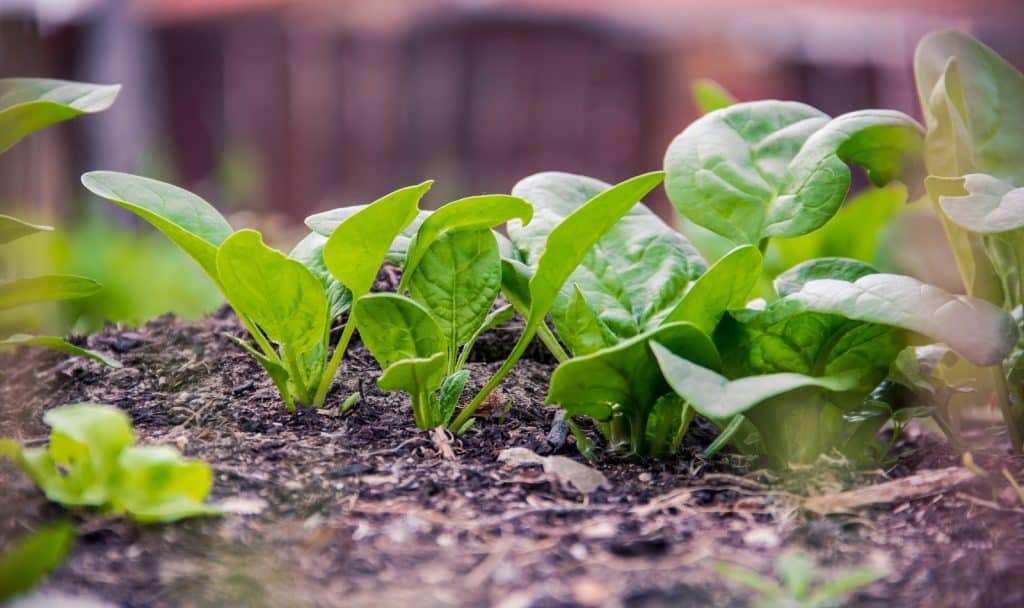
According to the NC State Veterinary Hospital, you need to avoid:
- cabbages
- Brussels sprouts
- spring greens
- chard
- kale
All of these are high in calcium oxalates that could lead to metabolic bone disease in reptiles.
At the same time, spinach, broccoli, and parsley are high in goitrogens, decreasing thyroid function. You should avoid them too.
Learn more about the bearded dragon diet and find complete lists on what else to feed them (and what NOT to feed them) in our brand-new book!
What Do Dragons Eat in the Wild?
Before humans captured them into our homes from the wilderness, wild dragons were opportunistic eaters who would eat anything that got into their way.
Insects were their staple food but with occasional wildflowers and plants here and there.
But then came domestication, and pet owners have to find out what these animals can or cannot eat.
Say, for example, you give them some fireflies. This is likely to cause problems since the chemical Luciferase that makes fireflies glow is toxic to dragons.
Also, bearded dragons can’t eat wasps, bees, or other stinging insects, either.
As you select the type of food to give your friend, take care only to get palatable insects and healthy greens.
What do dragons eat in the vivarium?
Dragons will eat a diet of insects as well as vegetables. They could also do with an occasional treat of fruits, but this should not be too often.
How Many Times to Feed Your Bearded Dragon?
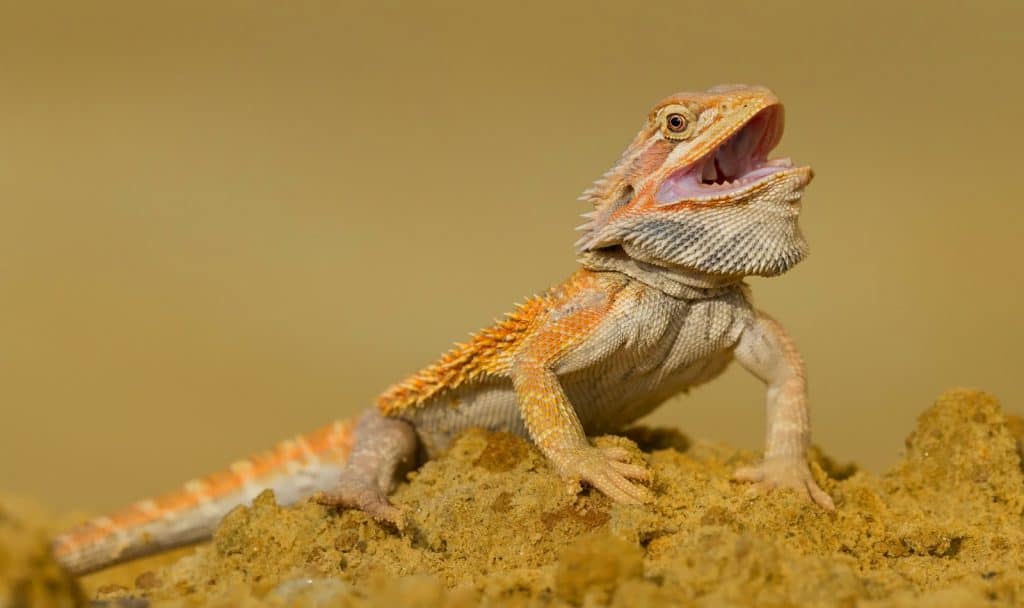
That answer depends entirely on their age. Babies need to eat multiple meals each day.
In fact, Reptile Guide recommends feeding them 5 times daily if they’re younger than 3 months.
For adult dragons, you can provide them daily. Make sure you give them enough to last the whole day. You can even safely skip a day here and there (but try not to).
However, they do need access to fresh water all of the time, so change that daily.
What to do if my bearded dragon will not eat vegetables?
Though they are not that picky with what they eat, bearded dragons might refuse the foods you give them. This is as a result of a few factors such as;
- The reptile is in a new home. It will take time before it familiarizes with the surroundings to feel comfortable taking the meals you offer.
- You might be feeding him with foods that lack flavor.
- She might not like the dead insects or canned fruits that you are giving her.
- The environment might be hostile for your pet.
Bearded dragons naturally like to eat. Therefore, it is a genuine worry for bearded dragon owners when their reptiles refuse to eat or ignore one food.
In the case that your pet refuses to eat vegetables, you need first to understand why.
Naturally, before we brought them to captivity, these pets roamed in the wild, eating whatever they chose and felt like eating.
They enjoyed live insects and fresh veggies. But in your vivarium, there is no adventure of capturing insects or choosing what greens to eat.
Once you understand this, you will be able to find out why your animal does not eat the veggies you bring into the vivarium.
Benefits Of Vegetables for Your Reptile
You also need to know a little biology about these reptiles. When young, they tend to be insectivorous, eating mostly insect meat.
As they grow older, they shift to want more vegetables in their diet.
The National Library of Medicine has published a report showing that bearded dragons have about 61% of their dry weight intake being animal protein.
Plant material only composes 16% of the total dry matter that they consume.
That small percentage of needed veggies notwithstanding, we all know the importance of vegetables in the diet of omnivores.
Vegetables are essential in a bearded dragon diet.
Vegetables help in the digestion of other foods since they act as roughage that will push whatever food is eaten down the alimentary canal.
Without them, your pet might suffer from indigestion and fecal impaction.
Vegetables are also a source of vitamins, phosphorus, and calcium, which are essential nutrients for your pet.
What To Do if Your Bearded Won’t Eat Them
Are you feeding your pet with only one vegetable? Try multiple vegetables forming part of his foods and find that one that rocks his boat.
Are you feeding him on only frozen and canned greens?
Change and try to give it fresh ones. They might not like the preservatives in those canned foods though they are still good for their nutrition.
Other reasons that might make your pet not eat are when they are stressed or that the vivarium’s environmental conditions are not friendly.
For example, when you place two male dragons in the same vivarium, they will fight.
One will dominate while the other has to submit. The submissive dragon might feel so intimidated to the point that they are unable to eat.
Too much light or heat in the vivarium might also make the pet unable to eat.
You, therefore, need to make sure that the environment is right for them.
Should you give your bearded dragon mineral supplements Along with Veggies?
Yes, according to the Pride Veterinary Centre of the UK, foods need to be dusted with a calcium powder supplement before feeding them to your bearded dragon.
The same thing needs to be done for all other supplements you may deem fit for your bearded dragon.
When giving live insects to your bearded dragon, you will need to gut load them so that the dragon can benefit from this supplementation.
Gut loading means feeding the insects with certain supplements so that they will eventually reach your dragon pal.
Once you dust your feeds with supplementation or feed your pet with gut-loaded insects, you do not need further supplementation.
Wrap-up FAQS about Bearded Dragons Eating Pea Shoots
We covered a lot of ground, so really quickly let’s do a wrap-up on the most frequently asked questions.
Can Bearded Dragons Eat Pea Pods and Peas?
Yes, along with the pea shoots, bearded dragons can eat pea pods as well as the peas inside of them.
Can Bearded Dragons Eat Sugar Snap Peas?
Yes, sugar snap peas are also safe for bearded dragons.
Are Frozen Peas Safe for Reptiles?
Yes, frozen peas are safe. However, your bearded dragon will most likely prefer fresh vegetables.
Can I grow My Own Pea Shoots for My Beardie?
If you can grow peas in your area, then yes, you can also grow pea shoots. Shoots are actually part of the pea plant. Just don’t use chemical fertilizers or weed killers.
Final Words on whether bearded dragons can eat pea shoots.
Long story short, yes, bearded dragons can eat pea shoots, but they shouldn’t make up the bulk of his diet.
Make sure you’re including a good mix of the other veggies that we discussed, as well as protein sources.
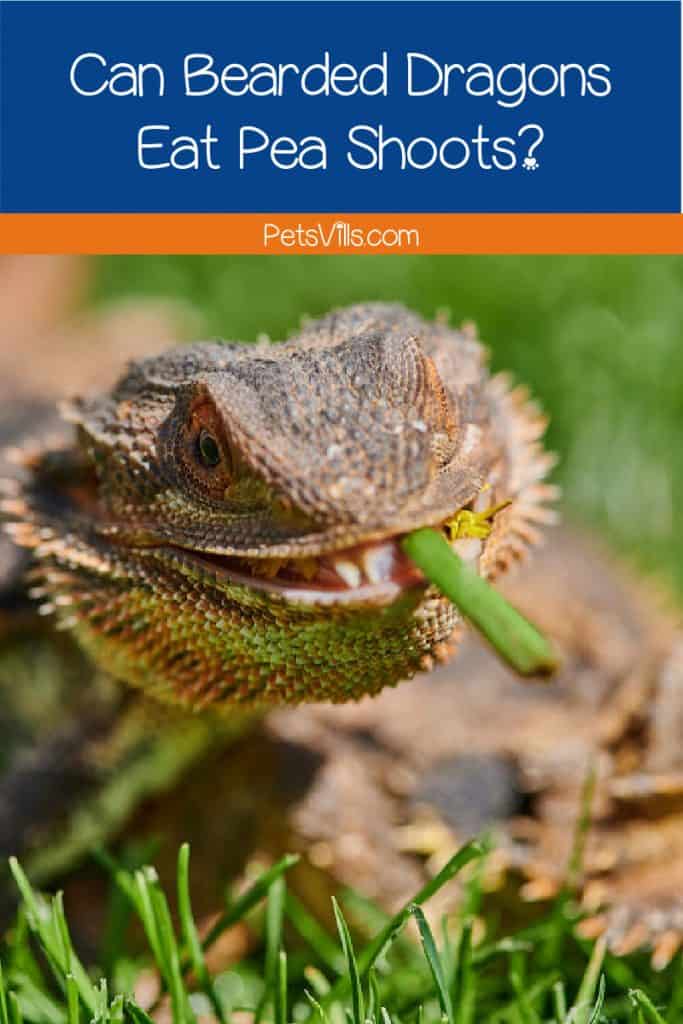
What do you think about our answer to “Can bearded dragons eat pea shoots?” Share below!
Barry Stingmore is a British content writer living in Fuerteventura, Spain. An animal lover at heart, he shares his home with a dog and four rescue cats and has a passion for writing about animals big and small.
Barry loves finding answers to your animal-related questions, the more research involved the better! You can rely on him to find the facts.
Find him on FACEBOOK, TWITTER AND Linkedin
Read his latest ARTICLES.
Find more about him HERE.

